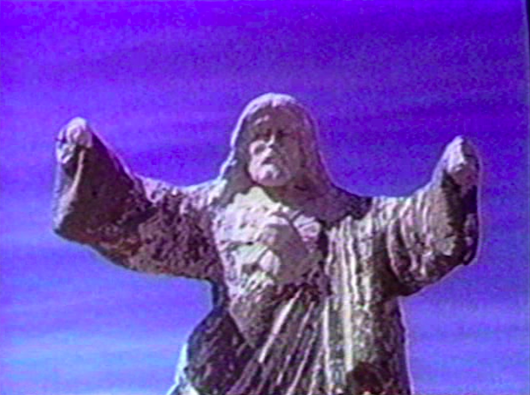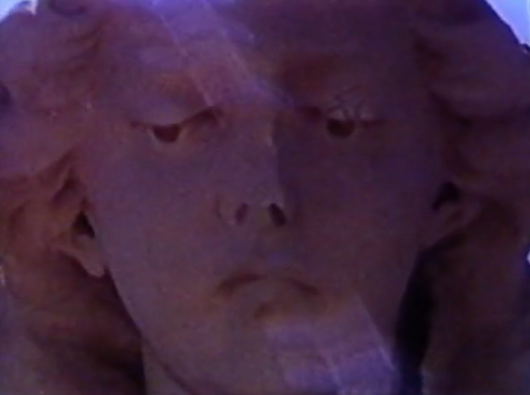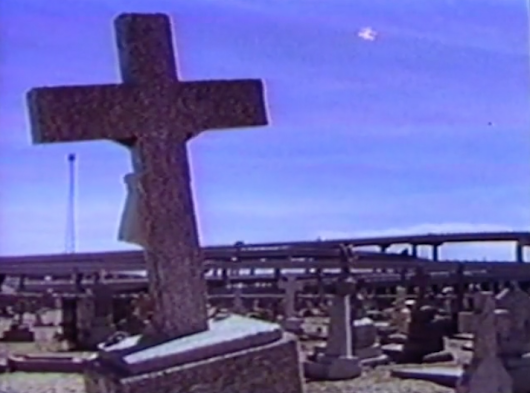 Cemeteries are known to be places of ambiguous nature. They separate the community of the living from the community of the dead, but at the same time they link the there-ness of death to the here-ness of living. They represent the ultimate destination for every individual and, as forums for spiritual exchange, they re-emphasize the finality of death. For an artist who has spent his entire life situated between two cultures and caught between the past and the future, a cemetery and its position as gatekeeper between two worlds seems to be a perfect location for filmic contemplation on eternal questions like “Why are we here?”
Cemeteries are known to be places of ambiguous nature. They separate the community of the living from the community of the dead, but at the same time they link the there-ness of death to the here-ness of living. They represent the ultimate destination for every individual and, as forums for spiritual exchange, they re-emphasize the finality of death. For an artist who has spent his entire life situated between two cultures and caught between the past and the future, a cemetery and its position as gatekeeper between two worlds seems to be a perfect location for filmic contemplation on eternal questions like “Why are we here?”
For Varela, an El Paso-based Chicano experimental filmmaker, the concept of the border, both as a real place and a state of mind, was an inescapable guiding force in the development of his artistic style. His unique visual language which aims to acknowledge «the reality that a Chicano must always have one eye pointing north and the other pointing south, with the occasional luxury of both eyes actually gazing inward» takes on new weight when placed in a cemetery, where up meets down, past meets future. Shot on Super 8 and set in the Concordia Cemetery in El Paso, Recuerdos de flores muertas (1982) shows a truly otherworldly place where the visitor is confronted with the inevitability of transience and the unrepeatable beauty of presence. Look – the family name on the headstones that introduce the film - serves as an invitation to follow Varela on his transitional journey to a land of wilting flowers and maimed sculptures where the tension between the here and there is maximized. For him, a «severely lapsed Catholic» who has been trying to understand the «rather strange, symbolic representations of God with the dead buried underneath», this poetic exploration is both genuinely personal and unavoidably political. For a long time in Varela’s life the personal and political represented two spheres that the artist tried but failed to isolate. In his case being «by default or definition» a Chicano experimental filmmaker the inner need to pursue his own personal cinema becomes political. When looking for ways to understand himself he claims the right to reflect on the «personhood that minorities are usually denied, and that [they] often deny [themselves]».
Look – the family name on the headstones that introduce the film - serves as an invitation to follow Varela on his transitional journey to a land of wilting flowers and maimed sculptures where the tension between the here and there is maximized. For him, a «severely lapsed Catholic» who has been trying to understand the «rather strange, symbolic representations of God with the dead buried underneath», this poetic exploration is both genuinely personal and unavoidably political. For a long time in Varela’s life the personal and political represented two spheres that the artist tried but failed to isolate. In his case being «by default or definition» a Chicano experimental filmmaker the inner need to pursue his own personal cinema becomes political. When looking for ways to understand himself he claims the right to reflect on the «personhood that minorities are usually denied, and that [they] often deny [themselves]».
Watching his seven-minute-long study of this sublime and eerie environment one cannot help but pick up on Varela’s cunning ways to achieve bilocation. Their faces to see the sky, the mutilated stone bodies of the cemetery seem to be forever bound to the ground they inhabit; deprived of their wings to fly away, their hands to reach out to God. The more intact figures, on the other hand, remind of an intangible “there-ness,” a subtle promise of a place away from the “here.” Walking among these opposing qualities, his shadow roaming the dusty ground while his camera repeatedly searches the sky, Varela manages to occupy two places at the same time. He walks with the dead, portrays the motionless, the mundane but clings on to the spheres of the living and the moving. Flowers withered and blooming, graves abandoned and dolled up, pale surfaces and repainted sculptures, the dusty ground and the clear sky, the fixed headstones and the circling cars on the highway – Varela’s depiction of the Concordia cemetery is in a way an illustration of himself as a Chicano artist, living on the border of the United States and Mexico, battling with an inner need to be personal and the external expectations to be political: a constant negotiation between two worlds.
Flowers withered and blooming, graves abandoned and dolled up, pale surfaces and repainted sculptures, the dusty ground and the clear sky, the fixed headstones and the circling cars on the highway – Varela’s depiction of the Concordia cemetery is in a way an illustration of himself as a Chicano artist, living on the border of the United States and Mexico, battling with an inner need to be personal and the external expectations to be political: a constant negotiation between two worlds.
As an uneasy transitional space the cemetery is awash with anxiety. For Varela, who in the year of finishing Recuerdos de flores muertas changed his nom de plume to Guillermo and moved to San Francisco, this filmic contemplation refers to a significant transition. In direct reference to his earlier work, Varela shapes this film into a study of light and rhythm with rapid and gestural camera movements; but he also reorients it, shifting from the exploration of domestic spaces to public ones and from the realm of the severely personal to the cautiously political.
Filmography
Recuerdos de flores muertas (Willie Varela 1982)